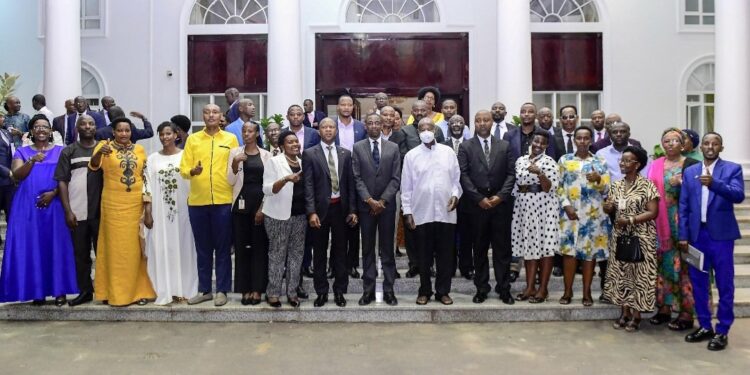The ongoing conflict within Uganda’s Banyarwanda community over identity and representation, spearheaded by Frank Gashumba and Fred Mukasa Mbidde, has raised eyebrows and dominated media headlines.
This struggle has unfolded at a time when Mbidde, previously detached from Banyarwanda issues, has assumed a vocal role in their representation. This shift occurred after his tenure at the East African Legislative Assembly (EALA) and a subsequent failed bid to represent Masaka’s Nyendo-Mukungwe Division in Uganda’s Parliament.
The tension between the two factions—one led by Gashumba, a long-time advocate for the Banyarwanda community, and the other backed by Mbidde—reflects deep divisions within the group.
So, why are these two camps at loggerheads?
Frank Gashumba’s Group: Advocating for “Abavandimwe”
Frank Gashumba leads the Council for Abavandimwe, a group advocating for the rights of Uganda’s Banyarwanda. His movement has highlighted systemic injustices, including the confiscation of national IDs, deregistration from government databases, and discriminatory practices at immigration offices.
Gashumba’s group argues that these actions have left many Banyarwanda stateless, unable to access basic rights such as employment, travel, or economic opportunities. The group’s persistent advocacy culminated in a meeting with President Museveni, where Gashumba secured an executive commitment to address these grievances.
Fred Mukasa Mbidde’s Group: Defending “Banyarwanda”
On the other hand, the Uganda Banyarwanda Cultural Development Association (UMUBANO), led by Simon Kayitana with legal backing from Mbidde, opposes the adoption of the term “Abavandimwe” (meaning “brethren”) proposed by Gashumba’s faction.
UMUBANO insists on retaining the “Banyarwanda” identity, which is constitutionally recognized, arguing that a shift to “Abavandimwe” could erode their heritage and legal standing. They have called for legal reforms to secure citizenship rights for Banyarwanda born in Uganda.
Points of Contention
- Identity Terminology:
Gashumba’s faction promotes “Abavandimwe” as a unifying term that distinguishes Ugandan Banyarwanda from nationals of Rwanda. Mbidde’s camp, however, argues that this change dilutes their identity and undermines their constitutional recognition. - Advocacy Approach:
Gashumba’s group relies on activism, engaging directly with government officials and leveraging public pressure. Meanwhile, Mbidde’s faction emphasizes legal reforms, advocating for amendments to Article 10 of the 1995 Constitution to solidify citizenship rights.
A Victory for Gashumba’s Faction?
Gashumba’s persistent efforts appear to have paid off. In a recent announcement, the Council for Abavandimwe revealed highlights from an executive order issued by President Museveni to address the plight of Uganda’s Banyarwanda. Key resolutions include:
- Reactivation of National IDs: IDs confiscated or deactivated will be returned and reactivated.
- Streamlined Passport Applications: Applicants presenting valid national IDs, supported by local authorities, will be promptly served.
- Family-Based Citizenship: Children of citizens cannot be denied national IDs or passports if their parents possess these documents.
- Abolition of Illegal Requirements: Demands such as presenting grandparents for interviews or proof of ancestral burial grounds will be eliminated.
Press Conference Announcement
To further discuss the executive order and its implications, Gashumba’s group has organized a press conference:
- Date: Friday, January 24, 2025
- Venue: Serena Hotel Gardens
- Time: 11:00 AM
The Council for Abavandimwe encourages all stakeholders, media representatives, and members of the Banyarwanda community to attend this event and learn more about the steps being taken to end their marginalization.
Conclusion
The fight between these two groups reflects broader struggles within the Banyarwanda community regarding identity, representation, and rights. While both factions pursue justice, their divergent strategies and ideologies have created a rift that risks overshadowing their shared goal: securing dignity and equality for Uganda’s Banyarwanda.
Do you have a story in your community or an opinion to share with us: Email us at editorial@watchdoguganda.com










